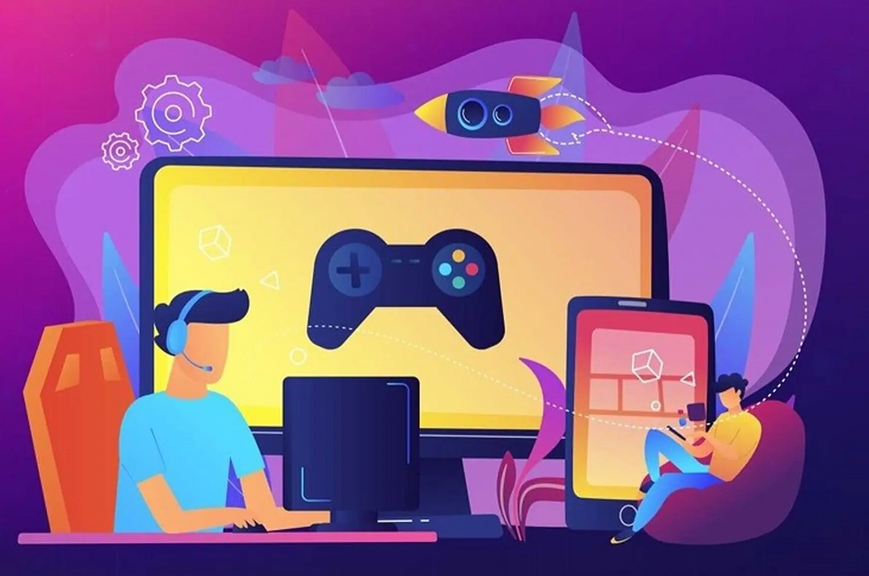A 2D game engine is the heart of any 2D game, providing the tools and technology to bring your creative vision to life. But with so many options available, choosing the right one can be overwhelming. This article dives into the world of 2D game engines, exploring what they are, comparing key features, pricing, and community support, and ultimately guiding you towards the perfect engine for your next project. Whether you’re a seasoned developer or just starting out, understanding the nuances of each engine will empower you to make an informed decision and embark on your game development journey with confidence.
What is a 2D Game Engine?
A 2D game engine is a software framework specifically designed for creating two-dimensional games. It’s like a pre-fabricated house, providing a foundation and structure so you don’t have to build everything from scratch. Instead of writing complex code for every aspect of your game, the engine handles core functionalities like rendering graphics, animating characters, managing physics, and handling user input. This allows developers to focus on the creative vision, bringing their game world to life.
These engines typically include a range of tools, including a rendering engine for visuals, a physics engine for realistic interactions, an animation system, input handling for player controls, a sound engine, a level editor, and often a scripting system for custom logic.
Whether you’re building a classic platformer, a side-scrolling adventure, a complex simulation, or a puzzle game, a 2D game engine significantly reduces development time and empowers both novice and experienced developers to create compelling games.
Comparing 2D game engines
Choosing the right 2D game engine can be a daunting task, given the variety of options available. This comparison breaks down key factors to consider: features, pricing, and community support. Understanding these aspects will help you choose the engine best suited to your project and experience level.
Feature comparison
Different engines offer different functionalities. Some excel in visual scripting for beginners, like Construct, while others provide powerful scripting languages like C# in Unity for more advanced development. Consider features essential to your game, such as:
- Built-in physics engine: How robust is the physics simulation? Does it support features you need?
- Animation tools: Are the animation tools user-friendly and powerful enough for your needs?
- Particle systems: How sophisticated are the particle effects for creating visual flair?
- Level editor: Is the level editor intuitive and efficient for designing your game worlds?
- Cross-platform support: Which platforms (Windows, macOS, Linux, mobile, web) does the engine support for exporting your game?
Pricing comparison
Game engine pricing models vary widely. Free and open-source engines like Godot offer an excellent entry point, especially for beginners and indie developers. However, be mindful of potential limitations, such as fewer features compared to paid options, or occasional instability in early versions. Some “free” engines might also have revenue sharing requirements once your game reaches a certain level of commercial success.
Subscription-based models like Unity offer tiered pricing plans, providing access to more features and support at higher tiers. This allows you to scale your costs as your project grows, but can become a significant expense over time. One-time purchase options like GameMaker Studio 2 provide perpetual access for a fixed fee, making them attractive for long-term projects but requiring a larger upfront investment. Carefully consider your budget and the long-term financial implications of each pricing model.
Community support comparison
A strong and active community is a crucial factor when choosing a game engine. It provides a lifeline for troubleshooting, learning new techniques, and accessing valuable resources. Look for engines with active forums, comprehensive documentation, plentiful tutorials, and readily available assets like art and sound effects.
Engines like Unity and Godot have thriving communities offering extensive support networks. This means you’re more likely to find answers to your questions, connect with other developers, and access a wealth of learning materials.
A smaller community might offer a more intimate experience, but may lack the breadth and depth of resources found in larger communities. Research the community surrounding each engine to gauge its activity level and ensure it aligns with your needs. A supportive community can significantly accelerate your learning curve and development process.
Choosing the right 2D game engine
With a plethora of 2D game engines available, selecting the perfect one for your project requires careful consideration. This section outlines key factors to help you navigate the decision-making process.
Identifying your needs
Before diving into the specifics of each engine, clearly define your project’s requirements. Ask yourself these crucial questions:
- What genre is your game? Different engines excel in different genres. Some are better suited for platformers, while others are more geared towards RPGs or simulations.
- What platforms are you targeting? Ensure the engine supports exporting to your desired platforms (Windows, macOS, Linux, mobile, web).
- What is your budget? Consider the long-term costs associated with each engine, including subscription fees or revenue sharing.
- What are your technical skills? Some engines require more programming experience than others. Visual scripting tools can be helpful for beginners.
- What features are essential for your game? Prioritize features like physics, animation, particle systems, networking, and level editing tools.
Considering your experience
Your experience level plays a significant role in choosing the right engine. If you’re a beginner, user-friendly engines with visual scripting tools, like Construct or GDevelop, can be a great starting point.
These engines minimize coding and allow you to focus on game logic. As you gain experience, you might explore more powerful engines like Unity or Godot, which offer greater flexibility and control.
Consulting the community
Don’t underestimate the value of community support. Engage with the communities surrounding different engines to gauge their activity level, helpfulness, and available resources. Active forums, tutorials, and documentation can be invaluable, especially when you encounter challenges.
Reading reviews and testimonials from other developers can also provide insights into the strengths and weaknesses of each engine. By carefully considering your needs, experience level, and community support, you can confidently choose the 2D game engine that best empowers you to bring your game vision to life.
FAQ
Embarking on your game development journey? This FAQ will address common questions about getting started with 2D game engines, covering everything from choosing the right engine to publishing your masterpiece.
Which 2D game engine is suitable for beginners?
Choosing the right engine is crucial. For beginners, user-friendly options like GDevelop, Construct, and GB Studio offer intuitive visual interfaces and require minimal coding. Unity and Godot Engine, while more powerful and versatile, also have excellent 2D support and offer a good balance of ease of use and advanced features, making them suitable for beginners willing to invest a little more time in learning. These engines allow you to create diverse genres, from platformers and RPGs to puzzle and strategy games.
What knowledge do I need to use a 2D game engine?
While some engines require minimal coding knowledge initially, understanding basic programming concepts like variables, loops, and functions can significantly enhance your game development abilities. Familiarity with design principles, such as game mechanics, level design, and user interface design, is also beneficial. Many engines offer excellent tutorials and documentation, making learning easier and more accessible. Don’t be afraid to experiment and learn as you go!
How much does it cost to use 2D game engines?
Many popular 2D game engines offer free versions, perfect for beginners or those on a budget. These free versions often have limitations, such as revenue sharing or limited access to certain features. Paid versions offer more advanced features, increased revenue share, and removal of branding requirements. Explore the specific pricing plans of each engine to find the best fit for your needs and budget. Examples include Unity’s free Personal edition and Godot Engine’s completely open-source and free nature. Investing in a paid version might be worthwhile as your project grows and your revenue increases.
In conclusion, 2D game engines offer diverse tools and capabilities for bringing your game ideas to life. From the beginner-friendly visual scripting of Construct and GDevelop to the robust flexibility of Unity and Godot Engine, and the specialized retro charm of GB Studio, the ideal engine for you depends on your specific needs, technical skills, and project scope. Carefully weigh the factors discussed – ease of use, features, cost, platform support, and community – to make an informed decision. With the right engine in hand, your 2D game development journey can be a rewarding and creative experience. So, explore the options, experiment, and start creating!





9 Comments
profis-vor-ort.de
Thank you for sharing such a well-structured and easy-to-digest post. It’s not always easy to find content that strikes the right balance between informative and engaging, but this piece really delivered. I appreciated how each section built on the last without overwhelming the reader. Even though I’ve come across similar topics before, the way you presented the information here made it more approachable. I’ll definitely be returning to this as a reference point. It’s the kind of post that’s genuinely helpful no matter your level of experience with the subject. Looking forward to reading more of your work—keep it up!
Willie George
I just like the helpful information you provide in your articles
Abraham Quinn
very informative articles or reviews at this time.
Lydia Bennett
This is really interesting, You’re a very skilled blogger. I’ve joined your feed and look forward to seeking more of your magnificent post. Also, I’ve shared your site in my social networks!
bọc ghế sofa tại nhà
I really like reading through a post that can make men and women think. Also, thank you for allowing me to comment!
boc ghe sofa
I really like reading through a post that can make men and women think. Also, thank you for allowing me to comment!
boc ghe sofa
This is my first time pay a quick visit at here and i am really happy to read everthing at one place
https://asesmen.mtssaljawami.sch.id/
Amazing love funny awesome wonderful cool strange funny funny.
Abia
Your creativity and passion for 😊 helping others really shows through every single word